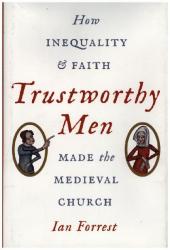 Neuerscheinungen 2018Stand: 2020-02-01 |
Schnellsuche
ISBN/Stichwort/Autor
|
Herderstraße 10
10625 Berlin
Tel.: 030 315 714 16
Fax 030 315 714 14
info@buchspektrum.de |

Ian Forrest
Trustworthy Men
How Inequality and Faith Made the Medieval Church
2018. 520 S. 12 b&w illus. 240 mm
Verlag/Jahr: PRINCETON UNIVERSITY PRESS 2018
ISBN: 0-691-18060-1 (0691180601)
Neue ISBN: 978-0-691-18060-1 (9780691180601)
Preis und Lieferzeit: Bitte klicken
Trustworthy men (in Latin, virifidedigni) were jurors, informants, and witnesses who represented their parishes when bishops needed local knowledge or reliable collaborators. Their importance in church courts, at inquests, and during visitations grew enormously between the thirteenth and fifteenth centuries. The church had to trust these men, and this trust rested on the complex and deep-rooted cultures of faith that underpinned promises and obligations, personal reputation and identity, and belief in God. But trust also had a dark side. For the church to discriminate between the trustworthy and untrustworthy was not to identify the most honest Christians but to find people whose status ensured their word would not be contradicted. This meant men rather than women, and- usually- the wealthier tenants and property holders in each parish. Trustworthy Men illustrates the ways in which the English church relied on and deepened inequalities within late medieval society, and how trust and faith were manipulated for political ends.
"Straddling social and ecclesiastical history, and the history of ideas, this elegant book investigates Episcopal bishops´ use of lay ´trustworthy men´ as witnesses and informants for various actions within the diocese. The themes explored are of profound importance, with very wide implications not only for those who work on the medieval church, but also for anyone interested in medieval society and governance."--John H. Arnold, University of Cambridge
Ian Forrest is fellow and tutor in history at Oriel College, University of Oxford. He is the author of The Detection of Heresy in Late Medieval England.


